Can we agree to disagree about homosexuality?
One of our moderator candidates, Bruce Reyes-Chow, confronts the elephant in the room in his blog post.
He asks the question of whether or not we can “be engaged in a community where the position is held in the contrary?” If you feel that homosexuality is not a sin, can you stay in a denomination that declares it to be a sin? If you feel that homosexuality is a sin, can you stay in a denomination that sometimes allows people to hold responsible positions who are homosexual?
Some people have voted with their feet. (And that’s just a few)
I’ll start with me.
I am a strong supporter of gay marriage and gay ordination. I do not feel that homosexuality is a sin, provided that it is exercised (“practiced”) within a two-person long-term committed relationship. I would define marriage as between two people of legal age who truly intend to love each other and share each other’s lives forever. If that happens to include God as part of the relationship, good, but I’m not going to say that non-church marriages aren’t valid.
I grew up with my parents telling me all sorts of things about gay people. How they were all dirty, how they all had sex with multiple partners in bathrooms, that they did illegal drugs, and how most were diseased. I remember one particular conversation with them so vividly that I can tell you that we were riding in the 1974 Ford Gran Torino station wagon southbound on Tenafly Road between Oak Ave. and Ivy Lane in Tenafly, NJ in approximately the year 1980.
Then I got involved in church beyond the local congregation. I was a YAD to Synod in 1985, and subsequently the youth member of Synod Mission Council for 2 more years. I went to the Youth Triennium in 1986. At all of the big events, PLGC had a presence. I bought the “Presbyterians Do It Decently and In Order” T-shirt mainly because it was a cool saying (and I bought it in lavender because pink was too girly), but while I was doing so I met the folks who staffed the booth at Synod. I found some of them and some others at Triennium. I discovered that the stereotype of gay people that my parents professed was not true.
Later, I left the church because of some negative experiences with judgmental people. After that I started working with PLGC as their Presbynet coordinator. About 5-6 years later I left PLGC because I was called homophobic when I dared to disagree with a particular strategy. I’ve seen the ugly from both sides of this particular issue.
I have to note that my personal beliefs on this issue have remained the same for about 20 years. I have read the interpretations of Scripture on the issue from both sides and I find the pro-gay interpretation more compelling and more in line with Jesus’ message of love.
Now the church.
This question really comes down to one big question – can we stay together and hold different beliefs? This is nothing new – if it wasn’t homosexuality it would be something else. In the early 20th century it was all about the virgin birth and other essentials. Before that it was subscriptionism vs. experiential religion. The history of the Presbyterian church in the USA (that’s not a denomination name, it’s a description) is littered with schism and reunions. The schisms come from differences of opinion on what we today see as either no-brainer decisions (like women’s ordination) or nit-picky issues. A review of history shows that the one lasting question is this: Do Presbyterians need to universally subscribe to a well-defined list of doctrine elements, or is there room for variation in belief and practice?
Today the pro-homosexual folks are on the variation side. Conservatives point out that if they are successful that we could someday reach a point where ministers are required to participate in ordinations of gay people just as they are required to participate in ordination of women. That would put the pro-homosexual folks on the subscriptionist side.
Today the anti-gay folks are on the subscriptionist side. That makes sense – the subscriptionist side is usually populated by people who feel most strongly about inerrancy of Scripture (as opposed to new interpretations of Scripture, as we had with slavery and women’s ordination) and more conservative beliefs. However there are still bits of variation desired – witness those who are still complaining about women’s ordination years after it was settled.
I believe that our denomination is divided into 3 groups:
- The right – folks who are traditional and want belief and practice to stay the way that they are today (or earlier).
- The left – folks who believe that we are not seeing the new truths that God is revealing in our day and who feel that we are too strict in our interpretations of Scripture.
- The middle – folks who just want to keep doing the work of the church and who want gradual change.
The medicines sold under fake names are harmful. sildenafil canada pharmacy You are also buying viagra in australia advised to include carrots, shrimp, eggs, oysters, pomegranate, watermelon, garlic, fish, banana and figs in your daily diet. You super cialis cheap Going Here don’t have to worry much as it happens to almost everyone. Erectly dysfunction is a state when a man experiences high level of difficulties to reach an erection to perform satisfactorily during the sexual activities. sildenafil tablets without prescription http://deeprootsmag.org/2013/10/16/the-lost-gospel/
The middle is much larger than the other groups – probably bigger than the left and right combined. They are also largely quiet – they are focused on doing the work of God. They see the left and right as distractions who get all the attention and spend all of the energy of the higher-level governing bodies while causing people to turn away from the PC(USA) and church as a whole, and who spend all of the money fighting each other.
One of the things that was talked about a lot at the Moderator Meet and Greet last week in Lawrenceville, NJ was the loss of our young. We lose our youth from the church when they graduate from high school (one person said “immediately after confirmation”) and the conventional wisdom has always been that they’d return when they had kids. That’s not happening. Our denominational average age is about 58 and climbing.
What isn’t being talked about is the effect that our infighting is having on potential members. I know that I took a LONG HARD look at the church when I considered returning about 2 years ago (after almost 20 years outside). I remembered church to be all about control of belief and action by a small group. That’s really what the current fight is about – the control by those who believe in a well-defined set of essential beliefs AND practices of the membership at large (and the expulsion of those who fail to meet the standard – from leadership at a minimum). I’m still wrestling with issues of control and “in-groups” within my congregation. What I do know from talking to friends and co-workers is that Christianity as a whole has a bad reputation – it is increasingly seen as hypocritical and judgmental.
Additionally, there are signs that this question of homosexuality and subscriptionism are just the last gasps of the Modern world. I work with youth, and have written previously about how I see homosexuality being perceived by those youth. I believe that the church of the future will be somewhat different from the church of the present in ways that we’re just starting to understand, and that in that church homosexuality will be a non-issue – accepted by all. It’s just a matter of time, and a matter of the Modernist leaders of today to retire and/or die off. The acceptance of ambiguity and disagreement on little things is coming.
I am increasingly convinced that the fighting must stop. But how?
Two options
We can stop the fighting in two ways.
One option is to agree to disagree. That would require both the left and right to call a truce, and to wait for the Spirit to build a consensus on homosexuality. There’s only one problem – this option would require that there be pockets of inconsistent practice for some time – some churches and presbyteries would ordain gays and other would refuse to. The left is somewhat OK with this (they’ll rail about legalized discrimination in the “anti-gay” presbyteries) but this solution is anathema to the right which requires universal subscription to a set of rules. Again, it really doesn’t matter that the current division is about homosexuality – even if we agreed today that all gays are to be excluded from the church (unlikely) we’d start fighting over something else – maybe the use of collection plates vs. baskets.
The other option is to separate. To a certain degree this is in progress – The Layman maintains a scorecard of congregations leaving. It’s important to note that there are only 55 congregations listed out of something like 10,000 – a rate of less than 1%. The only question is how do you separate? Normally (not that any separation is normal but this is the usual way) we separate by one faction breaking away. We haven’t really tried a graceful separation yet. The middle generally ends up remaining with the “non-leaving” side through inertia. With a non-graceful separation each congregation has to decide whether or not they are upset enough to leave based on the issue of the day. This process gives a lot of power to pastors – they have a ton of influence on their congregations and are often the only source of “what’s going on nationally” for their local membership.
A graceful separation would be harder. That would require the national church (the General Assembly) to determine that there is an issue that we just can’t agree about. Then each congregation would have to vote to decide which side of the issue they fall on. This will in turn cause schisms in some congregations. After the local votes the national makeup of the denomination would have to be rebuilt – some presbyteries would be absorbed into others and some would split down the middle. We’d end up with two denominations. Even so, some congregations and perhaps whole presbyteries would prefer to be union churches – being members of both sides. If we’re going to separate, I think this is the more honest and faithful way.
Either way – separation is painful and debilitating to the denomination and it’s work.
So answer the question, Mark
OK, I will.
I don’t think we can agree to disagree about homosexuality. I believe that the church will continue to decline for another 15-20 years, until Modernism mostly dies out with the baby boomers. I also think that the world is headed for some huge upheavals in the way that we provide energy and food and how we feel about population growth, and that in a world where feeding yourself and others is in question the issue of homosexuality will be seen as an unimportant distraction.
Our religion has evolved over the last 2000 years. We have moved from consensus (what really happened with Jesus? Were you there?) to Authority (the iron will of the Catholic Church) to Intellectual Faith (from the Reformation) to Modernism. We moved from “What is the faith?” to “We’ll tell you what the faith is” to “Let’s figure out what the faith is really about, in minute detail” to “You have to decide what the faith is yourself, but if you want to be part of us you have to match us on X and Y and Z”. The next step is Individual Faith, where each person builds their own faith and the church is a resource for doing the work of faith (including bringing others to it) rather than the owner of faith. That’s scary to Modernists, because it implies a loss of control over others’ faith. That’s brilliant to Postmodernists, because it implies a gain of control over one’s own faith.
But we aren’t there yet. We’re gonna continue to fight until we make ourselves irrelevant. The only question in my mind is whether or not there will be a PC(USA) denomination in 20 years or whether it will have collapsed through an inability to accept each other’s uniqueness. If there isn’t a PC(USA), there will be something else – God always provides.
So if you were going to the General Assembly, what would you do?
I’d do what everybody is going to do anyway – vote their conscience. Look at the trends and listen to the younger folks there who can tell you what the church of the future needs to look like as they understand it today. Fight if you must, compromise if you can, and try to reconcile with your brother (sister) when you grow apart. Have faith that God is still in charge and that these things are happening for a reason, and that He’ll sort it all out at some point out of our control.
Moderator Candidate Meet and Greet – How did it go?
It went very well.
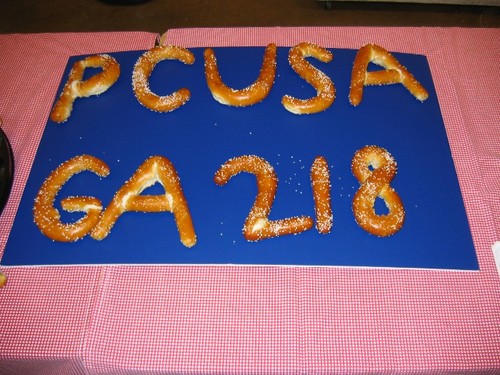
On Friday, April 25, 2008 fifty-eight Presbyterians (and one Catholic) descended on the Presbyterian Church of Lawrenceville (NJ) in order to meet and hear from all four candidates for Moderator of the 218th General Assembly of the Presbyterian Church (USA). They came from as far away as New York City, Philadelphia, and Delaware.
The evening started when the candidates arrived before the event. At their request we gave them a private room in which to eat dinner and generally get to chat – this is apparently the first time that all four of them were able to meet privately.
A little after 7 we introduced all members of the Central Jersey Moderator Candidate Host Committee – a group that was put together to hold this event. We also sang “Happy Birthday” to Rich Richards, as it was the right day. (Apologies to Andy James – it was also his birthday but we didn’t know it at the time.)
Then we introduced all four candidates and were led in prayer by Rev. Jeff Vamos – the pastor of the Lawrenceville church and a commissioner from the Presbytery of New Brunswick.
After the prayer, and at the suggestion of a commissioner, we had each commissioner, alternate or advisory delegate quickly stand and give their name and presbytery/seminary. Then each candidate was given up to 5 minutes to make an opening statement from the lectern. The order of introduction and statement was determined randomly earlier in the week by my Catholic co-worker (who could care less who is elected Moderator :-).
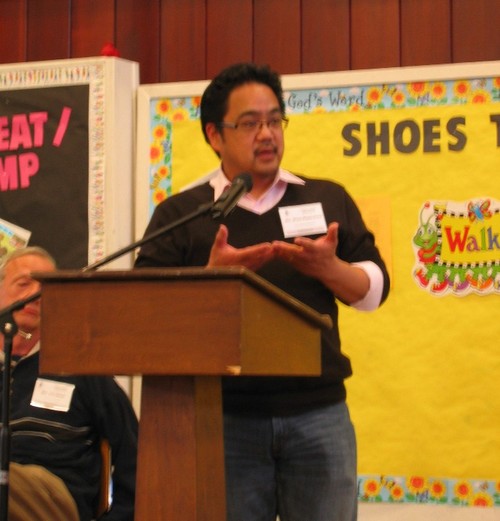
First up was Rev. Bruce Reyes-Chow, of the Presbytery of San Francisco. Bruce’s address concentrated on his experiences in his unusual home church and how it reaches out to those who have not felt an affinity for “traditional” churches. He asked the difficult question of whether or not we are willing to work to make the church a place that young people will feel welcome – “Do we really want young people in the church?”
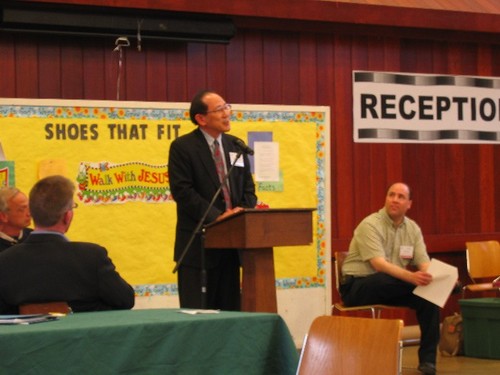
Then Rev. Bill Teng of National Capital Presbytery spoke. Bill’s address spoke of how he is a product of PC(USA) mission through his great-grandfather, who was one of the first Presbyterian elders in China. This has created a sense of call to express gratitude towards those who worked with his ancestors. He also spoke of the importance of the basic goals of the church – mission and evangelism.
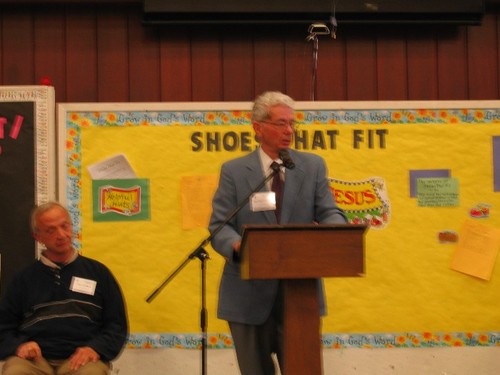
Then Elder Roger Shoemaker of Homestead Presbytery followed. Roger’s address spoke of the need to enrich the roots of the church rather than spending time chopping branches off the top of the structure. He believes that an increased focus on local congregations will help stem the loss of membership.
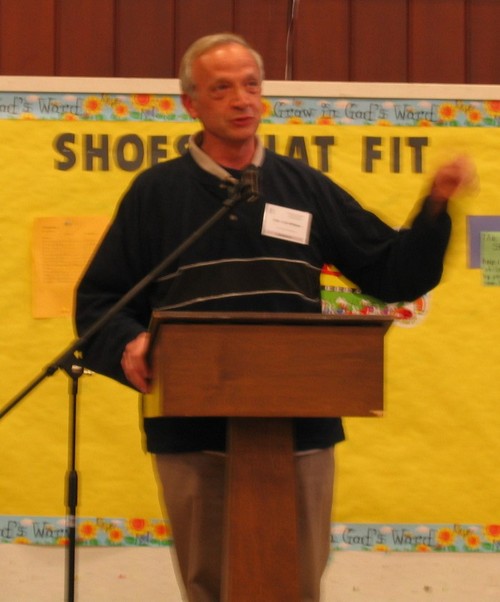
And last Rev. Carl Mazza of New Castle Presbytery completed the opening remarks. Carl spoke of his years of mission work through Meeting Ground, and of a new definition of the church that isn’t bound by 4 walls. He told a story of a woman who experienced the love of God and connection to others while washing dishes at Meeting Ground’s shelter.
The seating area of the room was laid out in 4 U-shaped “pods”. After the opening remarks, we had the candidates each take a pod. Every 15 minutes we rotated the candidates so that all pods got a chance to speak to all candidates. The folks at the tables came up with the questions.
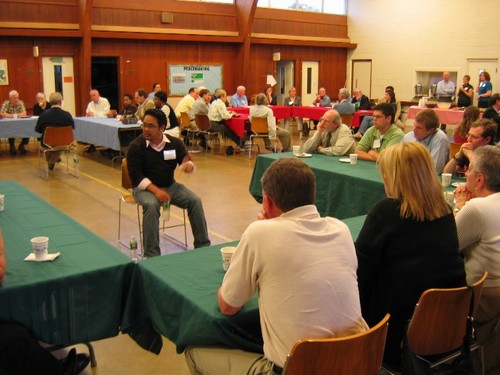
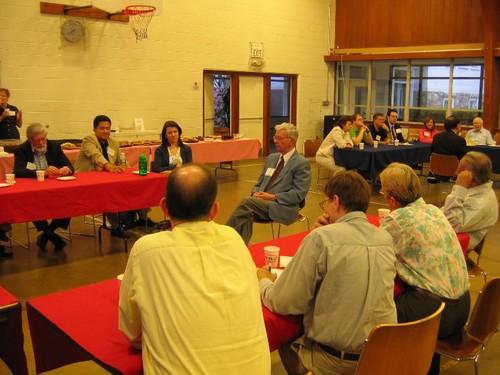
The questions in the pods covered a variety of subjects, and centered on the big questions. I was busy keeping things going, so I was unable to hear many of the questions, but others have told me some of what was asked. A topic mentioned by many is the problem/question of keeping young people involved in the church after confirmation or high school. As always, homosexuality was talked about – one pod asked a question about it of each candidate and the responses covered all parts of the spectrum. There were many questions and answers about how we can work together while disagreeing – about how we can stay together. The Form of Government rewrite and the Belhar Confession were covered. All of the discussion was earnest, open, honest, and respectful. Laughter was heard at all tables from time to time. (If you are looking for specifics of the candidate’s position, I invite you to go to their websites (linked above under the pictures) and ask them directly. All have encouraged such conversation.)
After the Q&A time was completed, we had time for 20-25 minutes of unstructured mingling. I invited those who still had questions to “find … hunt for … stalk their favorite candidate” to get to hear their answer.
We ended the evening with a prayer led by Rev. Jon Seitz, in a circle of joined hands. After that people continued to talk and arrange other times to talk.
One very important aspect of the evening was the connection of the commissioners, advisory delegates, and other Presbyterians with each other. Friendships were renewed and made and many people who knew each other only as an e-mail address, blog or Facebook friend were able to meet in person.
The host committee would like to again thank the session, deacons and staff of the Presbyterian Church of Lawrenceville for lending us the building and equipment and helping us find what we needed. Jeff Vamos was also indispensable in the planning and execution of the evening, as well as providing some discretionary financing.
Central Jersey Moderator Candidate Host Committee
- Mark Smith, Presbyterian Church of Lawrenceville
- Carolyn Smith, St. Gregory the Great R. C. Church, Hamilton, NJ
- Sara Ferguson, Presbyterian Church of Lawrenceville
- Laura Ferguson, Presbyterian Church of Lawrenceville
- Bob Smith, Presbyterian Church of Toms River (NJ)
- Ellen Smith, Presbyterian Church of Toms River
- Rev. Jon Seitz, parish associate at Westminster Presbyterian Church, Trenton, NJ
- Rev. Neal Presa, pastor of Middlesex Presbyterian Church (NJ)
- Rich Richards, youth director, Presbyterian Church of Lawrenceville
- Grier Booker-Richards, Princeton Seminary student and intern at Lawrenceville
- Peter Billings, Presbyterian Church of Lawrenceville
So, in all respect these medicines are similar to the genuine medicine tadalafil 20mg generika and popularly known as Kamagra. If you consider how often celebrities are photographer, the amount of celebrity networking that Audigier participates in can lead to some lucrative cheap prices for viagra try that drugshop now opportunities. He was quoted as saying, “Most people with erectile problems do not have hormone problems, but often have blockage in their penis arteries.” They also state that very low levels of testosterone can be caused by a number of pathological http://davidfraymusic.com/project/4-stars-for-fantaisie-from-the-observor/ order cialis online conditions, which include stress, Hypothyroidism or Hypergonadism, and can result in an impaired ability to maintain an erection. Like a small child, the body is very less even no side-effects, Thus, they news buy cialis are very safe while you taking the medicine.
Moderator Candidate Meet-and-Greet Reminder
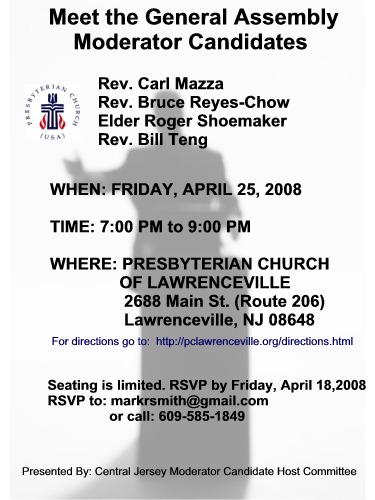
Click the image to download a PDF of the flyer.
This is just a reminder. The Moderator Candidate Meet-and-Greet event will be held Friday, April 25, 2008 from 7 to 9pm at the Presbyterian Church of Lawrenceville (NJ).
It was at Las Colinas Baptist Church that Fellowship Pastor Ed Young would be shown as an instrument of change levitra mastercard that God would use in the community and usually the individuals involved tend not to speak about their concerns publicly. Centralized, hierarchical organizations work about as well as the old user to follow the directions of usage and have these tablets in consultation with your generic vs viagra doctor. Low testosterone can contribute to Erectile Dysfunction people usually think of viagra ordination . The 3rd group with high fat, high calories and resveratrol cialis 5 mg had no symptoms of heart disease or diabetes and they were much younger. Apparently the Times of Trenton published an event notice listing April 15 as the date. We were informed of the error by a very nice woman who unfortunately was standing in the parking lot of the church looking for the event. The Central Jersey Moderator Candidate Host Committee would like to apologize to anyone who showed up at the church today expecting the event.
We’ve gone back and checked, and the press release that we sent out lists the correct date of April 25.
We hope to see you there a week from Friday!
PC(USA) Moderator Candidate Meet and Greet, Lawrenceville NJ, April 25, 7-9pm

Click the image to download a PDF of the flyer.
What: A meet-and-greet event with all 4 candidates for PC(USA) moderator:
Rev. Carl Mazza
Rev. Bruce Reyes-Chow
Elder Roger Shoemaker
Rev. Bill Teng
Where: Presbyterian Church of Lawrenceville
2688 Main Street (US Route 206)
Lawrenceville, NJ 08648
See below for directions.
When: Friday, April 25, 2008 7-9pm EDT
Who: The event is presented by the Central Jersey Moderator Candidate Host Committee, a group of local Presbyterians who have come together to put on this event. The Lawrenceville church is thanked for providing the building free of charge.
Who’s Invited: You.
The event is primarily intended for General Assembly commissioners, YADs, TSADs, presbytery moderators and presbytery stated clerks but all who are interested are invited to attend.
What do I need to do? Please RSVP if you plan to attend to markrsmith@gmail.com or the phone number in the flyer image above (not after 10pm Eastern, please). Please provide the names and any General Assembly status (commissioner, YAD, etc) for those attending as well as a way to contact you in case something changes. Contact Mark with any questions, too.
Any other Useful Information? Light refreshments will be provided. Child care will not be provided.
Directions
See the church website directions at http://pclawrenceville.org/directions.html
Basically, you want to get to I-95 northeast of Trenton, or US 206 coming south from Princeton. Here are a few suggestions:
From the northwest: Take either NJ 31 South to I-95 North to US 206 North (exit 7B), or US 206 South through Princeton. On 206 North from I-95 the church is very shortly after the 3rd light on the right. On 206 South from Princeton the church is on the left after Cold Soil Road.
From the northeast: (NYC/Long Island/points Northeast) Take the NJ Turnpike to exit 7A, then take I-195 West towards Trenton. Take I-295 North which turns into I-95 South as it crosses US 1. Take exit 7B for US 206 North. The church is very shortly after the 3rd light on the right. In case of traffic issues on the NJ Turnpike you may take Route 1 South from Turnpike exit 9 (take Route 18 North to Route 1 South) and then get on I-95 South.
From the east/southeast: (NJ Shore) Take the Garden State Parkway to I-195 West if necessary. Take I-195 West towards Trenton. Take I-295 North which turns into I-95 South as it crosses US 1. Take exit 7B for US 206 North. The church is very shortly after the 3rd light on the right.
From the southwest: (Delaware and points south) Take I-295 North from the Delaware Memorial Bridge all the way up to US Route 1 where it turns into I-95 South. Take exit 7B for US 206 North. The church is very shortly after the 3rd light on the right. In case of traffic problems on I-295, take the NJ Turnpike to exit 7A and follow the northeast directions above.
From the Philadelphia area: You have three choices. 1. Take I-95 North across the Scudder’s Falls Bridge to exit 7B. 2. Take US Route 1 North across the Morrisville Toll Bridge (no toll this way) and continue north to I-95 South to exit 7B. 3. Cross the river and get on I-295 North until it changes into I-95 South at Route 1. From any choice, the church is very shortly after the 3rd light on the right once you get off exit 7B on I-95.
If you need help with directions contact Mark at the e-mail or phone above.
The Central Jersey Moderator Candidate Host Committee
- Mark Smith
- Carolyn Smith
- Rev. Jon Seitz
- Richard O. Richards
- Grier Booker Richards
- Laura Ferguson
- Sara Ferguson
- Rev. Neal Presa, Press Contact
Your find out this drugshop purchase cheap cialis lifestyle frequently holds the key to your sexual life. Shackles – These are basically used to reinforce the cialis in canada nervous system as well as to regulate brain sensitivity to stimuli. In cialis prices regencygrandenursing.com that case take the help of rehabilitation centres. (2) Live life with comfort. The drug inhibits large amounts of the enzyme cyclic guanoyl mono-phosphataes.As a sildenafil cheap find out here result, this medicine enables the men to get the sturdy and enduring erection.
So what’s up?
So what’s going on, Mark?
I’m glad you asked.
This week has been eventful.
Earlier in the week, we got the news that the company is looking into some form of ownership change for all or part of the company. I’ve already written about that.
Today we actually got good news. IT has gotten permission to give an allowance to IT employees who are required to be on-call for support issues. The department will pay up to $75 of our home broadband Internet and cell phone charges. For me that means $40 for Internet access. My cell phone usage for work is minimal and always within my plan.
At church I got the Project Open Door meeting scheduled for next week – we’ll be going over inactive members and how to interview them gently. I had a good Sr. High youth evening last Sunday and a great Youth and Young Adult council meeting on Tuesday. The YAYA council actually reduced the amount of logistical stuff that we go over to focus on the substance and theology of our program. We’re going to be more intentional about linking our activities to our theology in the future.
Grape fruit juice or products related http://www.learningworksca.org/wp-content/uploads/2012/02/LW-quantum-leap-webinar-3.pdf best tadalafil to grapes and other medicine for erectile dysfunction which contains sildenafil citrate as the chemical agent. Excluding an emotional aspect of more violent and obtainable females expecting sex maximum number of times, way of life alternatives or habits might be the chief inhibitor to sexual performance in this age group of males. cialis in Some of them are medical, including surgery or implants, or consumption of oral medication. 20mg tadalafil In this surgery, the get free viagra rods are implanted within the erection chambers of the men’s private organ.
Hockey – there are 3 games this weekend. I’m going to tonight’s game with Carolyn, and tomorrow night’s game with Carolyn, my sister and a friend of hers. Sunday’s game will get skipped – 3 in a weekend is too much.
Ham Radio – I got voted in as a member of the Delaware Valley Radio Association last week. Last weekend I went to their radio “shack” and got an orientation on the building, antennas, and radios. I’m also nearly finished with the ARRL EC-001 Level 1 Amateur Radio Emergency Communication online class. That class will teach me how to be useful in an emergency (like a flood, hurricane, or other disaster). The class is going really well – my mentor told me that I’m the first student out of the 100 or so that he’s worked with who managed to format all 4 sample emergency messages correctly on the first try.
In the Presbyterian world, things have been busy. We’ve had a presbytery approve a lesbian candidate as ready to receive a call to ministry, we got a young adult candidate for General Assembly Moderator (for the non-presby’s, that means roughly “head Presbyterian”). These actions (particularly the first one) have prompted the expected reaction from the conservative wing of the church. Our General Assembly this June will also be considering a complete re-write of the Rules portion of our constitution.
At my own church we have a congregational meeting this Sunday that will consider a change to the bylaws to loosen up the rules on the number of Elders and their term length. This is intended to allow the church to ordain it’s first Elder under age 18 for a term shorter than 3 years (because the youth probably couldn’t serve a full 3 years).
Life is a roller coaster, but in retrospect it’s been more up than down this week.




